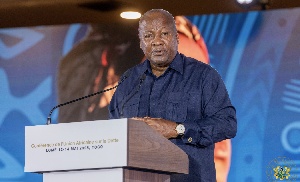- Home - News
- Elections 2024
- News Archive
- Crime & Punishment
- Politics
- Regional
- Editorial
- Health
- Ghanaians Abroad
- Tabloid
- Africa
- Religion
- Photo Archives
- Press Release
General News of Tuesday, 13 May 2025
Source: www.ghanawebbers.com
AU Conference on Debt: Mahama shares lessons on Ghana’s journey in debt restructuring
President John Mahama spoke to African leaders about Ghana’s debt restructuring. This took place at the African Union Conference on Debt in Lome, Togo.
The three-day meeting is organized by the African Union Commission. Its theme is “Africa’s Public Debt Management Agenda: Restoring and Safeguarding Debt Sustainability.”
Participants include AU Member States, policymakers, financial experts, and stakeholders. These groups consist of representatives from Ministries of Finance and African central banks.
President Mahama noted that Ghana faced a painful restructuring process. This was necessary to restore macroeconomic stability and rebuild investor confidence.
He emphasized that Ghana's experience reflects the broader African situation. In the early 2000s, Ghana reduced its debt-to-GDP ratio significantly under HIPC and MDRI initiatives.
This reduction allowed for investment in education, roads, and health sectors. Between 2006 and 2015, successive governments combined financing strategies for development.
In 2015, under his administration, Ghana entered an IMF-supported program. This aimed to restore fiscal discipline in the energy sector.
However, unrestrained borrowing led to rising debt levels after 2016. The debt-to-GDP ratio peaked at 90.7 percent in 2022.
By 2023, interest payments consumed 47 percent of government revenue. The World Bank described this level as fiscally unsustainable.
In 2024, Ghana reached a $5.4 billion debt restructuring deal with creditors. This provided essential relief but recovery remains complex.
President Mahama shared three key lessons from Ghana’s experience. First, timely engagement with creditors is crucial during crises.
Second, multilateral support must align with domestic development priorities. Third, sustainable debt involves governance and how funds are used.
He urged African leaders to take responsibility for their countries' debt issues. In Ghana, much recent borrowing went into budget support amid poor governance.
Mahama proposed a new public debt management agenda for Africa. It should focus on transparency and accountability to serve the people effectively.
This includes strengthening parliamentary oversight and enhancing public audits. Currently, less than 40 percent of African countries publish detailed debt reports.
He stressed responsible borrowing tied to high-impact projects for tangible returns. In Ghana, priority sectors include agriculture, renewable energy, infrastructure, health, and education.
These sectors can create jobs and drive innovation across the continent. He also called for regional solidarity in global financial reform efforts.
Africa must advocate for fairer global financial rules together as one voice. Credit rating agencies should consider structural reforms in their assessments of African economies.
Mahama highlighted the need to build capacity within African financial institutions like AfDB and AfriExim Bank for tailored financing solutions.
He concluded by emphasizing innovation as a guiding principle in debt strategy. Debt-for-climate swaps could help finance resilience while easing repayment pressures.











